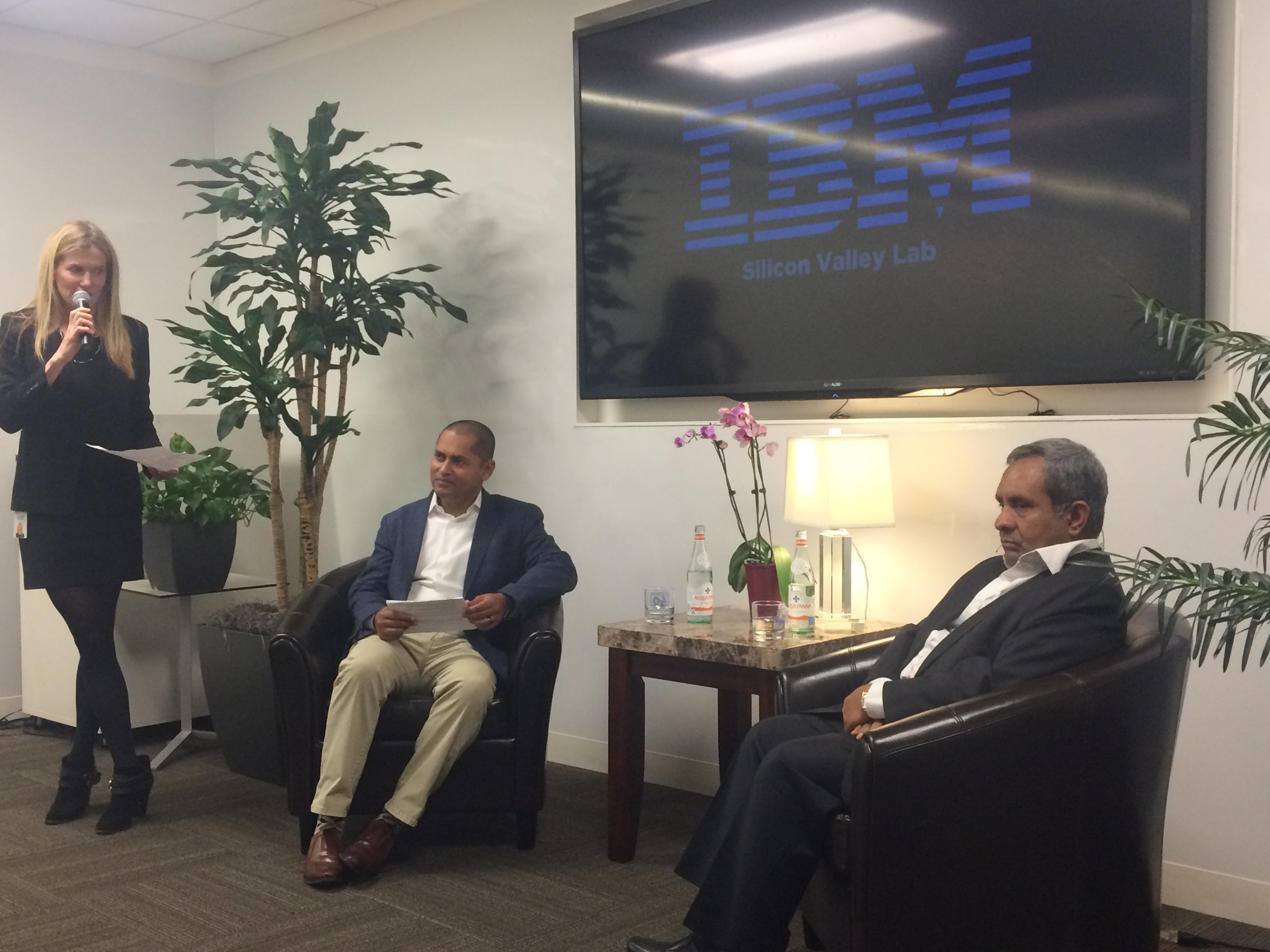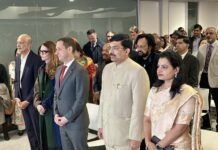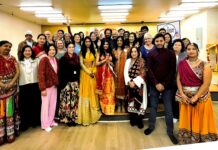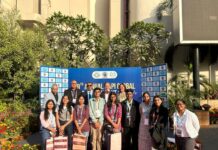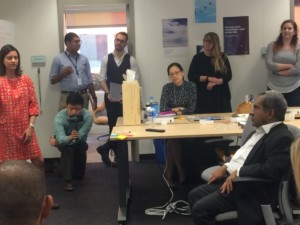 Lakshmi Iyer
Lakshmi Iyer
India Post News Service
The Indian Consul General (CG), Mr. Venkatesan Ashok, visited the IBM Silicon Valley Lab in San Jose, California on Tuesday, June 5.
IBM Silicon Valley Lab or SV Lab in short, opened in 1977 and is one of the first labs in the world devoted to software development and one of IBM’s six Machine Learning hubs around the world. In the interest of conservation, only 90 acres of a total of 1180 acres are devoted to its facilities. The rest are left for orchards and native plants and animals.
The CG was taken on a tour of the IBM facilities and some of the team members gave a presentation on the company’s AR (Augmented Reality) based data visualization platform, Immersion Insights. This technology takes data analysis to a whole different level, showing different factors in a visual interface.
Later, Dinesh Nirmal, VP Analytics Development at IBM Analytics, had a fireside chat with Mr. Venkatesan Ashok in one of the conference rooms packed with eager employees.
An engineering graduate from IIT, Mr. Venkatesan followed in the footsteps of his father and brother into government service.
After graduating, he was attracted by the prospect of studying and working in the United States. He applied to universities here, also appearing for the prestigious IFS (Indian Foreign Service) entrance exam. He got accepted into both – US universities and the IFS.
The deciding factor was the immediate availability of a job in the Foreign Service.
An engineer at heart, he said, “The first degree that you do in anything, whether it’s engineering or liberal arts or whatever, is only the framework on which you build the rest of your life. So, despite having left engineering and joined the Foreign Service, I still analyze problems that come and have come in the course of my career on a scientific and engineering basis.”
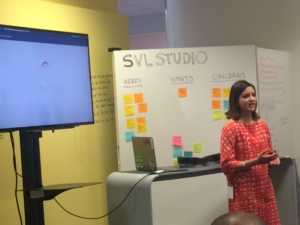 About his experiences being posted in a different location every few years, the effect on his family and learning foreign languages such as Chinese (Mandarin), he said, “The kind of opportunities you get, the people you meet, the countries you go to, the languages you encounter, the cultures you encounter… these are quite game changing and mind-blowing in their own way and I don’t think you can put a price point on how much you benefit from that.”
About his experiences being posted in a different location every few years, the effect on his family and learning foreign languages such as Chinese (Mandarin), he said, “The kind of opportunities you get, the people you meet, the countries you go to, the languages you encounter, the cultures you encounter… these are quite game changing and mind-blowing in their own way and I don’t think you can put a price point on how much you benefit from that.”
For his son, change was a little tough. On the other hand, he got a very different background to analyze the world and its problems. For instance, when the CG was posted in Zimbabwe, his son had classmates from Rwanda and Burundi and he heard about the problems of the Hutus and Tutsis from them.
While acknowledging the data privacy concerns with India’s Aadhar card system – the world’s largest biometric identification system for citizens based on fingerprinting and iris scan – the CG was quick to point out its benefits.
“The availability of Big Data and Aadhar has enabled us to create an ecosystem where people are able to get empowered.”
He explained that people were able to have bank accounts and digital lockers in the cloud where they store their most important documents such as birth certificates and passports. “You are able to have these people go to district offices and transact without having to carry these documents and lose them in the process.”
He mentioned that the Indian government was increasing cyber security to combat threats of data breaches.
He talked about the leapfrogging of technologies in India for many people, straight to mobile phones instead of first to landlines and in currency from cash to mobile payments, with some even skipping credit cards. The Indian government has about 92 subsidy schemes, one of which is the social security scheme for landless laborers. This scheme pays laborers 100 days’ wages while they are looking for another job between growing seasons.
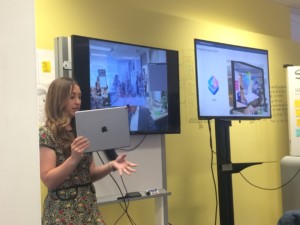 Earlier, this money would percolate from the Center through the State and local governments to the payees and quite some money would be lost due to corruption. “Now with mobile banking accounts in the hands of the villagers, this money is able to flow directly into the accounts of the villagers. So you are preventing corruption; you are enabling him to get his right.”
Earlier, this money would percolate from the Center through the State and local governments to the payees and quite some money would be lost due to corruption. “Now with mobile banking accounts in the hands of the villagers, this money is able to flow directly into the accounts of the villagers. So you are preventing corruption; you are enabling him to get his right.”
The CG is working with UC Berkeley and 50 companies in India in diverse sectors such as shrimp farming to handicrafts.
In partnership with UC Berkeley’s Haas School of Business, the CG’s office has implemented the Smart Village program in 472 villages in Andhra Pradesh. They have next been awarded a district in Uttar Pradesh and the entire state of Arunachal Pradesh. A Smart Village is, “basically, a community that uses digital technology and open innovation platforms to access global markets.”
Weavers and artisans making unique handicrafts, coconut growers wanting to sell extra coconuts instead of wasting them, shrimp growers wanting to increase the yield and hence seeking expert guidance from global companies, all these people benefit from this program.
Speaking of the challenges in agriculture, he mentioned that 54% of India is water-stressed, and that they need systems to control the water and make water sharing more equitable. He said that both India and China had a big role in using technology to enhance the lives of their people.
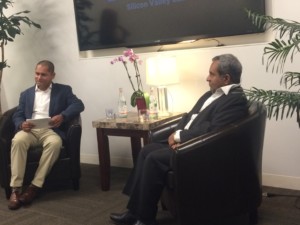 Earlier, Dinesh Nirmal had explained that IBM’s Immersive Insights is very helpful in analyzing various factors such as rainfall, groundwater levels and crop success in agriculture.
Earlier, Dinesh Nirmal had explained that IBM’s Immersive Insights is very helpful in analyzing various factors such as rainfall, groundwater levels and crop success in agriculture.
When asked about Zimbabwe, the economic and political crisis there, and India’s role, the CG said, “We (India) are not prescriptive. Unlike the West, which sort of told Zimbabwe you must do this… you must not do that, we feel that it is the job of the people of that country to educate their government. At the same time, we are conscious of the problems of Zimbabwe.”
During his tenure there, his office facilitated the setting up of new skilling centers in metalworking and woodworking, thus helping the local economy.
The CG also addressed a query related to delays in getting OCI (Overseas Citizen of India) cards.
It was a session filled with hope for the future.

